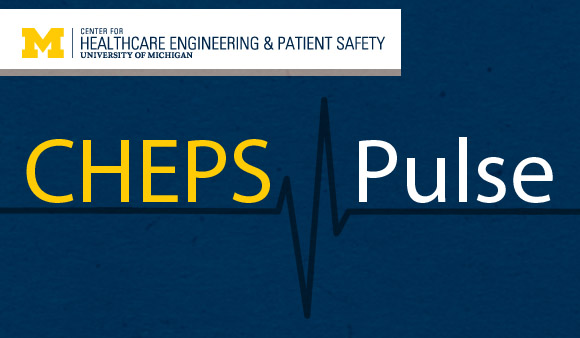In This Issue
- CHEPSter to CHEPSter: Computer Science Edition
- Recent News
- Fall 2021 Providing Better Healthcare Through Systems Engineering Seminars
- Student Blog
CHEPSter to CHEPSter: Computer Science Edition
An interview with Alum Eli Sherman by Cole Kingston
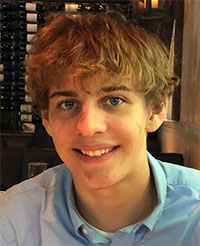
My name is Cole and I am currently a junior undergraduate student at the University of Michigan studying computer science. I had the great opportunity to interview Eli Sherman, a CHEPS alumnus who, when we spoke, was interning at IBM for the summer while also pursuing his Ph.D. at Johns Hopkins University. Eli’s work lies in computer science as well and I was extremely interested in learning more about how CHEPS impacted his career and the research that he is working on right now.
Eli began at CHEPS in the Spring of 2015, working through that summer and continuing through the next school year before eventually switching over to work in the Electrical Engineering and Computer Science (EECS) Department. The aspect of healthcare that intrigued Eli was how it seemed to connect to everybody because, rich or poor, everybody gets sick. At CHEPS, he worked on a shift scheduling project for the pediatrics emergency department of the hospital; his work consisted of coding the program for the schedule. Another project he worked on was reducing the length of stay in the pediatric emergency department (ED). This consisted of observing handoffs between residents changing shifts in the pediatric ED. Eli also worked on an aviation project with Professor Amy Cohn; the team would analyze airline data, such as taxi time and delays, and work on strategies that would help minimize delays and late flights.
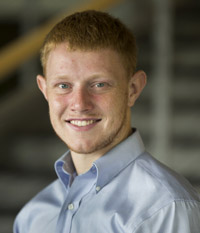
After finishing his undergraduate studies at Michigan, Eli went straight into graduate school at John Hopkins. Since starting his Ph.D., Eli continues to do much of his research in a field called causal inference, which is about finding methods to determine if groups have a causal relationship and estimating how strong their relationship is. Specifically, he works on dependent data context, for example, if a person receives a vaccine, that may affect their health but it also may affect another person’s health. This summer, Eli was a part of IBM Research in the Exploratory Science division and, when I spoke with him, he was working on the Responsible and Inclusive Technologies team. He was as an intern on a diverse team that includes sociologists, industrial operations engineers, and, of course, computer scientists. Eli explained that his experience with CHEPS put him in a unique position where he was able to act as a “middleman,” since he is incredibly knowledgeable with computer science but also has insight into aspects of the healthcare system. The team he was on worked on a wide variety of projects that focus on ensuring that technologies IBM develops are deployed in a responsible manner. Eli works on “fair” machine learning algorithms, for example, imagine a program that decides which drugs to give to certain patients at a hospital but due to a resource constraint, the program must decide how to allocate the best drugs among the patients in an impartial way.
In the future, Eli is looking towards becoming a professor and credits much of his inspiration to CHEPS Faculty Director Amy Cohn. When others ask him what type of professor he would want to be, Eli always ends up describing Professor Cohn. He hopes to follow her lead by putting students first and becoming a world leader in his field. When asked about what he took away from his experience at CHEPS, he explained how CHEPS emphasized the importance of a holistic view to healthcare research, where you need to analyze each perspective that is involved in your research (doctors, nurses, patients, etc.) to understand the problem you are trying to solve. Furthermore, he encouraged me to relish my time at CHEPS and explained that you never really “leave” CHEPS, as he continues to return to say hi to everyone in the office when he comes to Ann Arbor and stays a part of the community. I want to thank Eli for taking the time to talk to me about his time at CHEPS!
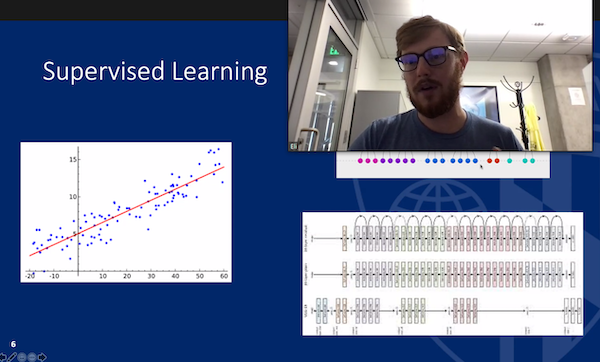
Recent News
- “Machine Learning and Causality: Building Efficient, Reliable Models for Decision-Making,” Maggie Makar Seminar, 9/20/21
- “How Safe Is Safe Enough: Analyzing Hazards and Risks in the Real World to Inform Decision Making,” James Bagian Seminar, 9/13/21
- CHEPS Ice Cream Social, 9/10/21
- Fall Kick-Off, 9/8/21
We will all require healthcare services at some point in our lifetime and we all live in an economy impacted by astronomically rising healthcare costs. This series consists of weekly seminars given by leading scholars in healthcare engineering and patient safety. See our 2021 seminar schedule here.
CHEPS Student Blog Posts
CHEPS students blog to share life at CHEPS from the student perspective.
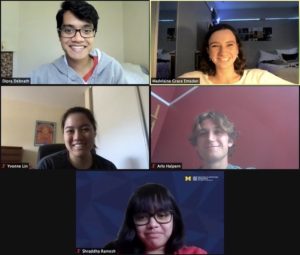 “We had to explain why we thought our schedule was good and should be used. This was not only an effective way to learn how to use the tool but also how to communicate the important aspects of the schedule to the Chief Resident.”
“We had to explain why we thought our schedule was good and should be used. This was not only an effective way to learn how to use the tool but also how to communicate the important aspects of the schedule to the Chief Resident.”
– Shift Scheduling Team blog
- Surgical Competency Team
- Prenatal Team
- Shift Scheduling Team
- Leena Ghrayeb, Industrial and Operations Engineering Ph.D. Student
- Adam VanDeusen, Industrial and Operations Engineering Ph.D. Student
- Emmett Springer, Biomedical Engineering Undergraduate
- Sebastian Munoz, Industrial & Operations Engineering Undergraduate
- Pushpendra (Ishu) Singh, Industrial & Operations Engineering Master’s 2020
- Dean Golan, Industrial & Operations Engineering Undergraduate
- Matt Howard, Industrial and Operations Engineering Undergraduate
- Luke Liu, 2020 Industrial & Operations Engineering B.S.
- Renata Terrazzan, Public Health Undergraduate
- Alli VanderStoep, Industrial & Operations Engineering Master’s Student
- Ziqi Wang, IOE/HEPS Master’s Student
- Carolyn Wu, Informatics Undergraduate
- Kristine Wang, 2020 Computer Science B.S.
- Nicholas Zacharek, Industrial & Operations Engineering Undergraduate
- Matt See, 2020 Chemistry B.S.
Center for Healthcare Engineering & Patient Safety | University of Michigan
[email protected] | cheps.engin.umich.edu

